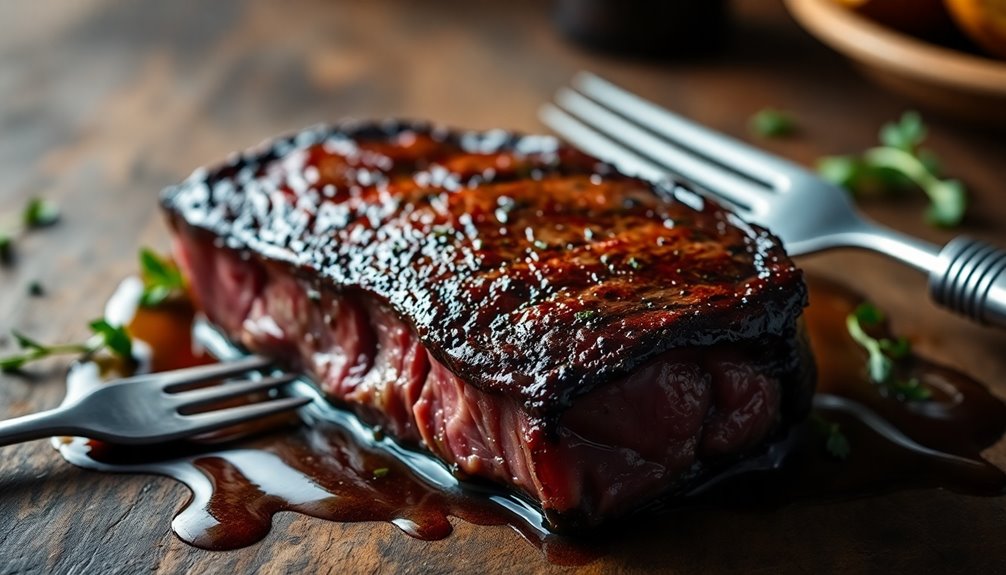The Carnivore Diet is a regimen focused on consuming solely animal products such as meat, fish, eggs, and dairy. Many individuals undergo weight loss and enhanced energy levels due to high protein and satiety. Historical evidence demonstrates early humans prospered on meat-heavy diets, bolstering its nutritional value. Nonetheless, it's essential to be mindful of possible risks, such as nutrient deficiencies and digestive issues. Seeking advice from a healthcare professional before beginning is vital. If you're interested in practical tips for adapting or wish to delve into personal experiences, there's plenty more to uncover about this distinctive dietary approach.
Key Takeaways
- The Carnivore Diet focuses on consuming animal products like meat, fish, eggs, and dairy for health benefits and simplicity.
- This diet may promote weight loss due to increased satiety from high-protein foods and can boost metabolism.
- Historical evidence shows that ancestral diets were primarily meat-based, supporting the diet's cultural foundation.
- Nutritional benefits include essential vitamins and minerals, complete proteins, and omega-3 fatty acids from animal sources.
- Potential risks include nutrient deficiencies, digestive issues, and social isolation; consulting a healthcare professional is recommended before starting.
What Is the Carnivore Diet?

The Carnivore Diet, at its core, is an eating plan that emphasizes the exclusive consumption of animal products, including meat, fish, and animal-derived foods like eggs and certain dairy items. This approach can seem extreme, but many people find it appealing due to its potential health benefits and simplicity. By eliminating plant-based foods, you're focusing on a diet rich in protein and healthy fats.
One of the most discussed advantages of the Carnivore Diet is its potential for weight loss. Since you're primarily consuming high-protein foods, you might experience increased satiety, which can lead to reduced calorie intake overall. Additionally, some studies suggest that a diet high in protein can boost metabolism, further supporting your weight-loss goals.
Beyond weight loss, proponents of the Carnivore Diet claim various health benefits, including improved mental clarity, enhanced mood, and reduced inflammation. Some individuals report relief from symptoms of autoimmune diseases, digestive issues, and food sensitivities. While more research is needed to substantiate these claims, many who adopt this diet find a sense of community and support among fellow practitioners. Additionally, engaging with an online support community can provide valuable insights and encouragement for those on this dietary journey.
It's vital, though, to approach any dietary change thoughtfully. Listening to your body and considering your unique health needs are essential. If you're thinking about trying the Carnivore Diet, connect with others who share your interest, and explore the potential benefits and challenges together. This journey can foster a sense of belonging as you navigate your way toward better health.
Historical Background of Carnivore Diet

While many modern diets emphasize plant-based foods, the roots of the Carnivore Diet can be traced back to ancient human history, where our ancestors primarily relied on animal sources for sustenance. Evolutionary evidence supports this, as early humans were hunter-gatherers, relying on meat for protein, fats, and essential nutrients. This dietary pattern likely contributed to the development of our large brains and complex social structures.
Cultural practices across various regions further illustrate the significance of animal-based diets. Indigenous communities, such as the Inuit and Maasai, have thrived on high-meat diets for generations, adapting their lifestyles to their environments. These cultures often emphasize the importance of animal hunting, not just for nutrition but as an essential aspect of identity and community bonding.
As you explore the historical context of the Carnivore Diet, it's clear that our relationship with animal-based foods is deep-rooted. Many of these ancient practices still resonate today, as people seek to reconnect with their ancestral diets. This longing for belonging is a powerful motivator for adopting the Carnivore Diet, as it taps into a shared heritage that emphasizes survival and resilience.
Understanding this historical background allows you to appreciate the Carnivore Diet not merely as a modern trend but as a continuation of a long-standing human tradition. It invites you to reflect on your own dietary choices and consider how they connect you to the past. Moreover, embracing natural calorie cycles can enhance your overall health and well-being, allowing for a more balanced approach to nutrition.
Potential Benefits of the Diet

Many followers of the Carnivore Diet report a range of potential benefits that stem from eliminating plant-based foods. One of the most commonly noted advantages is weight loss. By focusing solely on animal products, you might find it easier to control your calorie intake and reduce cravings for high-carb foods. This diet typically involves higher protein and fat consumption, which can lead to a feeling of fullness that helps you manage your weight effectively.
Another benefit that many enthusiasts share is an increase in mental clarity. Some individuals have experienced enhanced cognitive function and improved focus after adopting this diet. The theory is that by eliminating potential allergens and anti-nutrients commonly found in plants, your body can function more efficiently, allowing you to think more clearly and concentrate better on tasks.
Additionally, followers often report stable energy levels throughout the day. Without the blood sugar spikes and crashes associated with carbohydrate-heavy diets, you may feel more energized and productive. This sense of stability can be particularly appealing if you're looking to improve your daily performance, both mentally and physically.
Moreover, the Carnivore Diet may also promote better muscle activation, which is essential for overall physical performance and can lead to improved strength. It's important to remember that experiences can vary from person to person. While many folks find these benefits compelling, individual results will depend on a range of factors, including lifestyle and health status. As you explore the Carnivore Diet, you might discover if these potential benefits resonate with you and your goals.
Possible Risks and Drawbacks

Adopting the Carnivore Diet comes with several potential risks and drawbacks that you should consider before making the switch. While you might be drawn to its simplicity and promise of weight loss, understanding the possible health implications and long-term effects on your body is fundamental.
Some of the concerns include:
- Nutrient deficiencies: A lack of vital vitamins and minerals can lead to various health issues.
- Digestive problems: Shifting to a meat-only diet can disrupt your gut health, causing constipation or other digestive discomforts.
- Increased cholesterol levels: High saturated fat intake might elevate your cholesterol levels, putting your heart health at risk.
- Social isolation: Following such a restrictive diet can make dining out or social gatherings uncomfortable, leading to feelings of isolation.
Research on the long-term effects of the Carnivore Diet is limited, and many experts caution against making it a permanent lifestyle choice. The absence of whole foods like fruits and vegetables may not provide the necessary fiber and antioxidants your body craves. Additionally, the consumption of high-glycemic foods can lead to increased blood sugar levels, potentially complicating your health further.
Furthermore, the potential increase in saturated fat and protein intake could pose risks for kidney health and cardiovascular issues.
Before diving into this diet, it's important to weigh these risks against your health goals. Consulting with a healthcare professional can guide you in making an informed decision that prioritizes your well-being while aiming for connection and community in your dietary journey.
Nutritional Profile of Animal Products

The nutritional profile of animal products is rich and varied, offering a range of essential nutrients that are essential for maintaining overall health. When you incorporate these foods into your diet, you tap into some of the best protein sources available. Animal products like meat, fish, and eggs are high in complete proteins, which contain all the essential amino acids your body needs for muscle repair, immune function, and overall energy.
In addition to protein, animal products are excellent for your vitamin intake. They provide significant amounts of B vitamins, particularly B12, which is vital for red blood cell formation and nerve health. Many people struggle to get enough B12 from plant-based sources, making animal products a key player in ensuring you meet your nutritional needs.
Moreover, fatty fish like salmon are packed with omega-3 fatty acids, which are known for their anti-inflammatory properties and heart health benefits. Dairy products, such as yogurt and cheese, deliver calcium and vitamin D, supporting bone health and immune function.
While plant foods can offer certain nutrients, the unique combination found in animal products helps create a balanced nutritional profile. This can be particularly beneficial for those following the carnivore diet, as it allows you to enjoy a diverse array of nutrients all in one place. By focusing on high-quality animal products, you can feel confident that you're nourishing your body effectively. Additionally, drinking water from SlimCrystal bottles can further enhance your overall health and vitality.
Who Should Try the Carnivore Diet?

For those seeking a straightforward approach to nutrition, the carnivore diet may be worth considering. This meat-centric eating plan could be particularly appealing if you have specific health conditions that require a more simplified diet. Many people report improvements in symptoms related to autoimmune disorders, digestive issues, and even mental health challenges when they switch to an all-meat regimen.
If you're an athlete or bodybuilder, the carnivore diet might also align well with your goals. It's rich in protein and nutrients that support muscle growth and recovery, potentially giving you the edge you need in performance.
Here are a few reasons you might want to explore the carnivore diet:
- Simplicity: No need to count calories or track macros.
- Clarity: Reduced food choices can lead to less decision fatigue.
- Community: Join a growing group of individuals who share similar health journeys.
- Resilience: Witness how your body adapts and thrives on a nutrient-dense diet.
Before diving into this lifestyle, it's essential to evaluate your health needs and consult with a healthcare professional. The carnivore diet may not be suitable for everyone, but for those with specific health conditions or athletic performance goals, it could provide a unique path to wellness. Additionally, the impact of liver health on overall well-being should not be overlooked, as it plays a crucial role in how our bodies process nutrients and detoxify. Embrace the journey, connect with others, and see how this approach might transform your relationship with food and health.
Common Myths Debunked

Many misconceptions surround the carnivore diet, which can make it difficult to understand its potential benefits and drawbacks. One common myth is that you'll miss out on essential nutrients by cutting out plant-based alternatives. While it's true that dietary diversity is typically recommended for peak health, proponents argue that animal products can provide most, if not all, of the necessary vitamins and minerals.
For example, organ meats are rich in essential nutrients like Vitamin A and B12, which are often cited as lacking in a strictly plant-based diet.
Another myth is that the carnivore diet leads to health issues like heart disease or high cholesterol. Numerous anecdotal reports and some preliminary studies suggest that many individuals actually experience improvements in their lipid profiles and overall health when adhering to this diet. However, it's crucial to recognize that individual responses can vary; what works for one person may not work for another.
Lastly, some people believe the carnivore diet promotes an unsustainable way of eating. While it may seem restrictive, many followers find a sense of community and belonging within this lifestyle. They often share recipes, tips, and personal success stories, fostering a supportive environment. Additionally, adopting a plant-based diet can offer significant health benefits, providing a rich source of antioxidants and fiber that supports overall well-being.
Tips for Transitioning to Carnivore

Shifting towards a carnivore diet can be a significant adjustment, but with the right approach, it can be a manageable and rewarding experience. To make this change smoother, you'll want to focus on meal planning and how to handle social situations that may arise.
Start by preparing a few meals in advance. This not only saves time but helps you avoid cravings for non-carnivore foods. Consider these helpful tips:
- Find a supportive community online or in person to share experiences and recipes.
- Experiment with different cuts of meat to discover what you enjoy most.
- Keep simple snacks on hand, like beef jerky or pork rinds, to satisfy hunger between meals.
- Be open and honest with friends and family about your dietary choices; it assists them in understanding your journey.
In social situations, it's vital to have a plan. Don't hesitate to suggest restaurants with carnivore-friendly options, or even offer to bring a dish if you're attending a gathering. Having a few go-to meals in mind can also alleviate the pressure of dining out. Additionally, embracing a carnivore diet can lead to improved metabolism and energy levels, similar to the benefits noted by celebrities who have transitioned to a plant-based diet.
Personal Experiences and Testimonials

Starting a carnivore diet often leads to a variety of personal experiences that highlight its impact on health and lifestyle. Many individuals share success stories that reveal transformative journeys. You might find that eliminating carbohydrates and focusing solely on animal products helps you manage weight more effectively. Users often report significant health improvements, including reduced inflammation, increased energy levels, and better mental clarity.
For instance, some participants have noticed substantial reductions in chronic pain and digestive issues, which they attribute to the diet's simplicity. By cutting out processed foods, you could experience a clearer sense of what fuels your body best. Testimonials frequently showcase improvements in blood markers, such as cholesterol and blood sugar levels, which can be reassuring if you've struggled with these issues in the past. Notably, similar findings have been reported in scientific studies that explore the impacts of dietary changes on health markers.
Community support plays a critical role here. You're not alone in your journey; many others are facing similar challenges and triumphs. Engaging with like-minded individuals online or in local meetups can provide encouragement and practical tips.
However, it's also important to approach this diet with realistic expectations. Not everyone will experience the same benefits, and some may face initial hurdles like adaptation symptoms. Listening to your body and making adjustments as needed is essential. Ultimately, personal experiences within the carnivore community can offer valuable insights while underscoring the importance of individualized approaches to health and nutrition.
Frequently Asked Questions
Can I Consume Dairy on the Carnivore Diet?
You might wonder if you can consume dairy while following a strict meat-based diet. The dairy controversy often revolves around its nutritional implications, like lactose intolerance and potential inflammation.
While some people include dairy for added fats and proteins, others argue it can hinder health goals. It's important to listen to your body and consider how dairy affects you personally.
Experiment with different options to find the best fit for your dietary needs.
How Does the Carnivore Diet Affect Athletic Performance?
Think of your body as a finely-tuned machine; every part needs the right fuel. When you follow a strict meat-based diet, you might notice varying effects on muscle gain and endurance levels.
Some athletes report enhanced strength due to increased protein intake, while others find their endurance levels dip without carbs.
Pay attention to your body and adjust your nutrition accordingly to find what truly works for your performance goals.
Is Intermittent Fasting Compatible With the Carnivore Diet?
Yes, intermittent fasting can be compatible with your dietary choices. You might find that fasting benefits, like improved mental clarity and enhanced fat burning, align well with your routine.
However, be mindful of potential digestive issues; consuming significant quantities of meat after fasting might cause discomfort for some individuals.
It's crucial to pay attention to your body and make necessary changes, ensuring that both practices work harmoniously for your overall health and well-being.
Will I Need to Take Supplements on This Diet?
Whether you'll need supplements depends on your individual nutrient intake and absorption. While many people find they meet their nutritional needs through whole foods, some might need supplements for specific nutrients, like vitamin D or omega-3 fatty acids. Paying attention to your body and monitoring how you feel is crucial.
If you notice deficiencies or lack of energy, consulting a healthcare professional can help you determine the best approach for your health journey.
How Do I Handle Social Situations While Following the Carnivore Diet?
Exploring social situations can feel challenging when your eating habits differ from those around you. When dining out, seek out meat-centric dishes or communicate your needs to the staff. At family gatherings, don't hesitate to bring your own dish; it sparks conversation and shows your dedication.
You're not alone in wanting to belong—many people appreciate your commitment to a healthy lifestyle, and it often motivates them to ponder their own choices.
Conclusion
As you consider the carnivore diet, envision a plate filled with succulent steaks, crunchy bacon, and tender ribs, all filled with protein and necessary nutrients. While this method offers potential advantages, like weight loss and enhanced energy, it's important to evaluate the risks and make sure it fits your lifestyle. Whether you opt to immerse yourself in a world of meat or investigate other possibilities, pay attention to your body and make well-informed decisions that nourish you.



